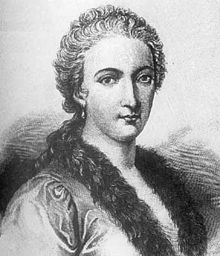Born in Milan in 1718, Maria Gaetana Agnesi was recognized for her intelligence from a very early age. By the time she was 11, she could speak seven languages: Italian, French, Greek, Hebrew, Spanish, German, and Latin, the last of which she used to give a speech (at the age of nine) on the right of women to be educated.
As Maria entered her teens, she was studying ballistics, geometry, and defending theses on philosophical topics to her father’s friends and colleagues (he was a professor of mathematics at the University of Bologna). Due to shyness, Maria did not enjoy these performances, and instead wished to enter a convent. Though her father refused, he did allow her to withdraw from society and devote herself to the study of mathematics and the teaching of her 20 siblings (her father remarried twice after the death of Maria’s mother, which is what allowed Maria to withdraw from public life).
Maria devoted her studies to differential and integral calculus, and ultimately became a professor at the University of Bologna, and was only the second woman to be granted a professorship at a university. She wrote the Instituzioni analitiche, primarily for teaching her siblings calculus. In it, concepts are clearly explained, with lots of examples, and it’s two volumes are still considered seminal works in the field of mathematics.

